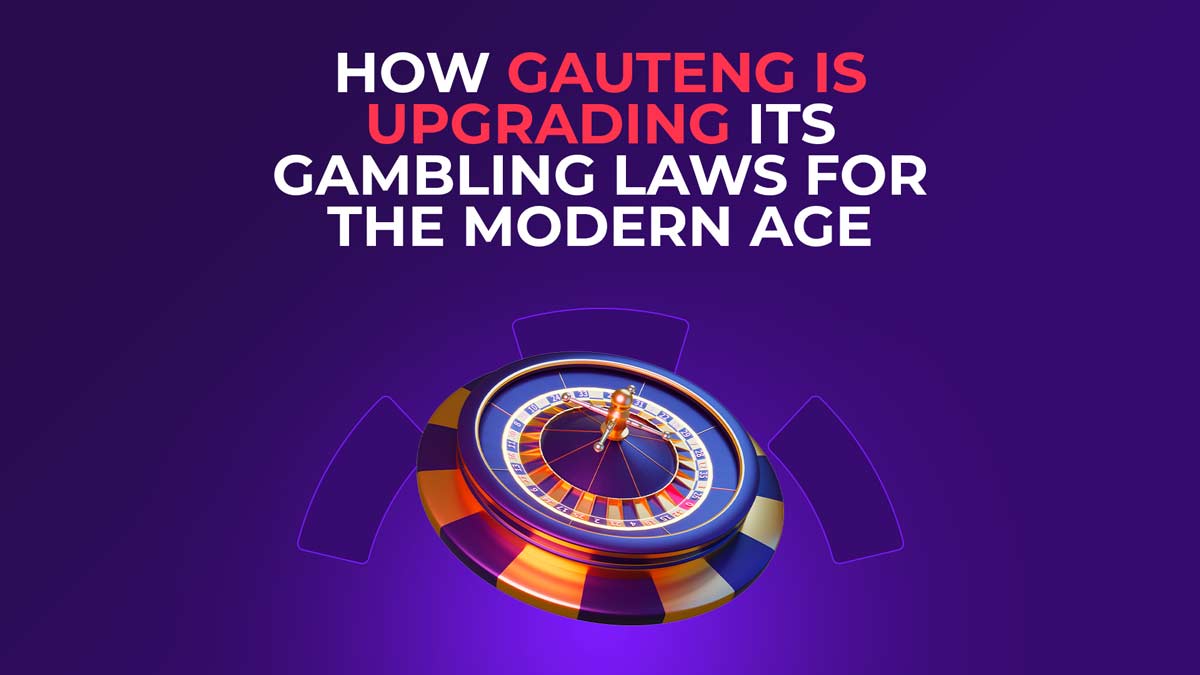How Gauteng is Upgrading its Gambling Laws for the Modern Age
Gauteng is embarking on significant reforms to its gambling legislation, with a particular emphasis on regulating online gambling. The Gauteng Member of the Executive Council (MEC) for Finance and Economic Development, Lebogang Maile, recently underscored the pressing need to update the Gauteng Gambling Act to address the rapid expansion of online gambling and its associated challenges. In July 2025, MEC Maile met with representatives from the Gauteng Gambling Board, legal advisors, and other key stakeholders to expedite amendments to the provincial gambling law. These reforms aim to modernize the regulatory framework of the gambling industry, improve tax revenue collection from online gambling, and enhance community safety through strengthened oversight and robust player protection measures.
Why Gauteng urgently needs to change its legislation
MEC Maile has emphasized that Gauteng’s gambling legislation is outdated, as the industry has evolved dramatically since the law was first passed in the 1990s. In particular, the explosive rise of online gambling has exposed gaps in the current regulatory regime – online gambling remains largely unregulated under existing law. Maile warned that Gauteng has been “falling behind” other provinces like Mpumalanga and the Western Cape in effectively governing the modern gambling landscape. Those provinces have implemented more up-to-date regulations, allowing them to better control emerging forms of gambling and capture related benefits. Gauteng’s lag in oversight not only means lost economic opportunities but also leaves the public less protected in the face of new gambling modes. Recognizing this, provincial authorities see the amendments as vital to modernize the legislation and “keep pace with developments in the sector”. The goal is to restore Gauteng’s leadership in gambling regulation and innovation, a role it has ceded as other regions moved ahead with progressive policies.
Scope of the Proposed Reforms
The proposed amendments to the Gauteng Gambling Act are broad in scope, targeting several critical areas of regulation. According to MEC Maile’s statements, the reforms will specifically address:
- Online Gambling: Bringing internet-based betting and gaming into the legal framework. This includes creating provisions for licensing and monitoring online gambling operators, which are currently outside provincial oversight. By explicitly legalizing and regulating online platforms, Gauteng aims to secure the online gambling space and eliminate the grey market that has thrived under the old law.
- Licensing and Compliance: Updating licensing requirements to cover new gambling activities and tightening compliance standards for all operators. The law will define clear criteria for granting licenses to online gambling companies and ensure they adhere to financial, technical, and responsible gambling regulations.
- Player Protection Measures: Enhancing safeguards for gamblers by instituting stronger player protection rules. This likely involves stricter age verification to prevent underage gambling, options for self-exclusion or betting limits to curb problem gambling, and requirements for fair play and transparency on online platforms. Protecting consumers is a core objective so that people can participate in gambling without falling victim to fraud, addiction, or other harms.
- Enforcement and Penalties: Strengthening the enforcement mechanisms against illegal gambling and non-compliant operators. The reforms seek to give regulators more teeth – for example, empowering inspectors to act against unlicensed online gambling sites and increasing penalties for those who operate outside the law. By bolstering enforcement, Gauteng intends to deter illegal gambling activities that currently flourish due to regulatory loopholes.
- Oversight and Governance: Modernizing the overall governance of the gambling sector to improve oversight. This includes better resourcing of the Gauteng Gambling Board and integrating new technology for monitoring gambling transactions. As MEC Maile noted, the amendment aims to ensure “robust oversight that protects both the industry and the public”. A more empowered regulator will be able to supervise gambling operations (including online platforms) in real-time and intervene when irregularities or criminal elements are detected.
These areas of reform collectively point toward a comprehensive modernization of Gauteng’s gambling laws. By revising definitions and rules to include online gambling and by tightening regulatory controls, the province is updating its legal toolkit to deal with 21st-century gambling realities.
One of the driving motivations behind Gauteng’s gambling law reform is the potential to significantly boost tax revenue by capturing the online gambling sector. Currently, the provincial government’s gambling revenue comes mainly from licensing fees and taxes on land-based casinos, betting shops, and other physical gambling establishments.
Online gambling operators, however, have fallen outside this tax net because the law did not formally recognize or license them. MEC Maile has pointed out that while “people are making a lot of money from online gambling,” Gauteng is “not getting the tax that’s due to us” from those activities. This gap has real fiscal consequences. Research by the National Gambling Board found that roughly 80% of all betting revenue in South Africa now comes from online sources (as of 2024).
Gauteng, being the economic hub of the country, accounts for a large share of the nation’s gambling market – a recent report showed Gauteng contributed about 22% of South Africa’s gross gaming revenue, second only to the Western Cape’s 32%.
Many of the online gamblers are Gauteng residents, yet the profits from their wagers often go untaxed provincially (flowing either to offshore sites or to operators licensed in other regions). The Western Cape and Mpumalanga, having more advanced online gambling frameworks, have been quicker to capitalize on this trend, leaving Gauteng “losing ground” in revenue collection.
To address this, Gauteng’s new legislation will explicitly tax online gambling companies operating in the province. During the 2025/26 budget presentation, MEC Maile announced that a draft amendment was ready to bring online operators into the tax framework. Under the planned law, internet gambling platforms catering to Gauteng players will be required to obtain provincial licenses and pay applicable taxes, just like physical casinos or betting shops. “Online betting accounted for 80% of total betting revenue in 2024,” an industry report noted, underscoring the rich revenue source Gauteng aims to tap. By legislating this change, the province stands to increase its tax base substantially, generating funds that can support public services and developmental projects. Importantly, Gauteng’s proactive move to tax and regulate online gambling could set a precedent nationally. With national gambling amendment bills stalled in Parliament, provinces are taking initiative to secure their own revenue streams. As the province contributing the most to South Africa’s GDP, Gauteng’s success in capturing online gambling revenue may encourage others (and the national government) to follow suit. In the near term, though, Gauteng’s focus is on ensuring no more tax revenue “leaks” out through unregulated gambling – all substantial betting activity by its residents should contribute to the Gauteng fiscus under the new law.
Enhancing Gambler Safety and Protection
Beyond revenue, Gauteng’s gambling law reforms are designed to make the gambling environment safer for communities and players through better regulation. Under the status quo, the proliferation of unregulated gambling – from illegal online betting websites to underground gambling dens – has posed risks to public safety and welfare. Lax oversight enables criminal syndicates and unscrupulous operators to exploit vulnerable people. For instance, inadequate enforcement in Gauteng has left some communities “vulnerable to illegal gambling dens, which fuel financial ruin, violence, and broken families” according to investigative reports.
These illegal operations often evade taxes, ignore responsible gambling practices, and may be tied to organized crime, creating a threat to community safety. By modernizing the law, Gauteng plans to crack down on such illegal gambling activities. The inclusion of online gambling in the legal framework means that residents will have safer, licensed platforms to play on, rather than turning to black-market websites. Licensed operators will be subject to strict regulations and audits, ensuring they operate fairly and pay out winnings, and that they implement measures to prevent underage or excessive gambling. This greatly reduces the risks for ordinary gamblers – they can engage in betting entertainment without being exposed to scams or predatory practices that are common in unregulated spaces. Moreover, part of the reform is to beef up enforcement capacity: with clearer laws, the Gauteng Gambling Board and law enforcement can more easily shut down unlicensed operators and penalize those breaking the rules.
Higher penalties and better coordination with police are expected, so that illicit gambling venues or sites can be swiftly dealt with. Crucially, the reforms emphasize player protection and responsible gambling. This facet of the law is directly aimed at community well-being. New provisions will likely mandate that operators provide tools for players to manage their gambling (such as self-imposed limits or self-exclusion programs) and require contributions to problem gambling counselling and education programs.
With nearly 3,000 South Africans seeking help for gambling addiction in 2023/24 (an almost eight-fold increase from just a few years prior), stronger regulatory intervention is needed to curb the social harms of gambling. By having legal, monitored online gambling options, the government can also more easily promote responsible gambling messaging and intervene when individuals show signs of gambling addiction (for example, through voluntary exclusion registers). Overall, better regulation serves as a protective barrier for communities. It keeps criminal elements out of the gambling industry and ensures that gambling is conducted in a controlled, transparent manner. MEC Maile highlighted that the legislative amendment is meant to “ensure robust oversight that protects both the industry and the public”.
In practice, this means the public can have confidence that gambling in Gauteng – whether at a casino or on a smartphone – is subject to rules that prioritize safety, fairness, and accountability. Reduced illegal gambling translates to fewer associated crimes (loan sharking, money laundering, violence at illicit venues), thereby enhancing the overall safety of neighbourhoods. And by protecting players from exploitation and excessive losses, the reforms aim to prevent the severe personal and familial crises that unchecked gambling can cause. In sum, the new regulations strive to make gambling a safer activity and to shield communities from the negative externalities of the gambling industry.
How Gambling Law Reform Can Benefit Local Communities
The Gauteng government anticipates several tangible benefits for local communities arising from these gambling law reforms. First and foremost is the increase in provincial revenue, which can be channelled into public goods. Additional tax income from online gambling will bolster Gauteng’s budget, potentially funding improvements in infrastructure, education, healthcare, or community programs. This means the reforms could indirectly lead to better services and development projects at the community level, financed by the gambling sector’s contributions to the fiscus. It aligns with the provincial priority of finding alternative revenue streams to support Gauteng’s socio-economic initiatives.
Secondly, the reforms are expected to stimulate economic activity and job creation in the legal gambling industry. By legitimizing online gambling operations, Gauteng could attract licensed iGaming companies to base their operations in the province. This would create jobs in tech, customer service, and compliance roles for local residents. Over time, a well-regulated and thriving gambling sector (both online and land-based) can contribute to economic growth and tourism (for example, Gauteng’s casinos and betting companies could innovate and draw visitors or participants from beyond the province, knowing there is a stable regulatory environment). Most importantly, communities stand to gain from the social safeguards built into the new regulatory framework.
Stronger oversight and enforcement will mean fewer illegal gambling outlets in neighbourhoods – residents will no longer have to contend with the nuisance and danger of illicit gambling houses that often breed crime. Law-abiding citizens will be safer as gambling-related criminal networks are squeezed out by legal competition and police action. Furthermore, families and individuals will benefit from the emphasis on responsible gambling: with better player protection, there may be fewer cases of gambling addiction spiralling into personal bankruptcy or domestic problems. In the long run, the community at large benefits when gambling is kept as a regulated leisure activity rather than a lawless enterprise. As one local report noted, failing to control gambling allows syndicates to take hold and “leaves communities vulnerable”, whereas firm regulation can prevent such harms.
By modernizing and securing online gambling through these reforms, Gauteng is effectively updating the social contract around gambling. The industry will be allowed to flourish, but only under conditions that ensure it contributes to the public good (through taxes and jobs) and minimizes social risks. Local communities can expect a more accountable industry that supports the province’s development and operates with care for the people. In essence, the anticipated outcome is a win-win: economic gains for Gauteng’s people alongside a safer, more regulated gambling environment.
A recent meeting of Gauteng officials and gambling regulators to plan urgent amendments to the Gauteng Gambling Act (July 2025). The provincial government is engaging stakeholders to fast-track the new legislation, reflecting its high priority for both economic and social policy.
https://focusgn.com/africa/gauteng-mec-calls-for-urgent-amendment-to-gambling-laws
Next steps for Gauteng’s Gambling Law Modernization
Gauteng’s initiative to amend its gambling laws marks a pivotal step in aligning the province’s regulatory regime with the realities of the digital age. MEC Lebogang Maile’s advocacy for these changes underlines a dual objective: to boost provincial revenues by tapping into the booming online gambling market, and to protect communities through stringent regulation and oversight. The reforms currently underway – encompassing online gambling legalization, improved licensing and compliance rules, enhanced player protections, and tougher enforcement – are comprehensive in scope. They are crafted to not only close loopholes that have permitted untaxed and unsafe gambling activities, but also to set Gauteng up as a leader in gambling innovation and governance.
If successfully enacted and implemented, these changes will modernize Gauteng’s gambling industry by bringing it under a secure, well-regulated umbrella. The province is poised to reclaim its “rightful place” in gambling oversight and innovation within South Africa, after having trailed other regions. More importantly, Gauteng’s citizens stand to reap the benefits: from increased public funds for community development, to a safer environment where gambling is enjoyed responsibly and illicit operators are kept at bay. This proactive reform effort demonstrates how provincial authorities can respond to emerging challenges with forward-looking policy. By improving tax collection and enhancing community safety through better regulation, Gauteng’s gambling law amendments aim to ensure that the growth of online gambling will be a boon for the province’s economy and society, rather than a threat.







